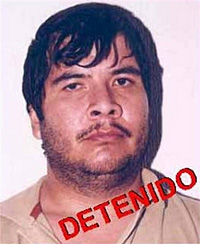 |
 |
 |
 Editorials | Issues | January 2007 Editorials | Issues | January 2007  
Mexico: No U.S. Pressure in Extraditions
 Mark Stevenson - Associated Press Mark Stevenson - Associated Press


| | This file undated photo released by the Mexican Attorney General's Office shows convicted drug trafficker Gilberto Higuera Guerrero after he was arrested in 2004 at a house in Mexicali, across the border from Calexico, California. The U.S. praised Mexico for extraditing an 'unprecedented' group of alleged drug lords to the U.S. to face justice, with Higuera Herrero among them, on Friday Jan. 19, 2007, a move that could up the ante in Mexico's drug war and prevent traffickers from running cartels from prisons. (Mexico Attorney Generals Office) |
Mexico's attorney general said Sunday four alleged drug lords were extradited to the United States to stop them from communicating with their cartels from behind bars and to reduce the risk of violence and escape, not because of U.S. pressure.

Mexico sent Osiel Cardenas, the alleged Gulf cartel leader who was believed to be running his gang from prison, to the U.S. on Friday along with Palma Salazar, the alleged former leader of the Sinaloa cartel, and brothers Ismael and Gilberto Higuera Guerrero, former chiefs in the Arellano-Felix cartel in Tijuana.

"This decision was a unilateral and sovereign one by the Mexican government," Attorney General Eduardo Medina Mora told a news conference. The aim was to break any "physical and geographical" contact they might have had with their gangs while in Mexican prisons. He also said Mexico plans to extradite other criminals and suspects who have exhausted their legal appeals.

Mexico has recently shown more willingness to extradite drug lords, even those facing life in prison. A record 63 alleged criminals were sent to the U.S. in 2006 alone. However, it refuses to extradite anyone who would face the death penalty, which is illegal in Mexico

Along with the four drug lords, Mexico also extradited 11 alleged criminals wanted in the U.S. on charges including murder, drug trafficking, kidnapping and sex crimes.

U.S. Attorney General Alberto Gonzales called the extraditions "unprecedented in their scope and importance."

In an interview with the Spanish newspaper El Pais published Sunday, President Felipe Calderon acknowledged that "organized crime was getting out of control ... there was a risk in Latin America that Mexico could become a country dominated by insecurity and violence."

The attorney general's comments appear to be a public admission that Mexico was struggling to keep traffickers like Cardenas from running their gangs, or staging escapes and assassinations, from behind bars.

The Mexican attorney general's office has also said the extraditions were aimed in part at cracking down on turf battles between Mexican drug cartels, which have cost hundreds of lives in recent months in states like Michoacan, Guerrero, Baja California and Sinaloa. The government has recently sent thousands of soldiers and police to try to stem the drug-fueled violence.

Medina Mora acknowledged that while Mexico could suffer some backlash, he did not believe it would face anything like the war Colombian drug traffickers fought in the 1980s to avoid extradition.

In the 1980s, a group of Colombian traffickers known as "los extraditables" began a campaign of bombings and assassinations to pressure the Colombian government not to send them to the United States to face justice. | 
 | |
 |



